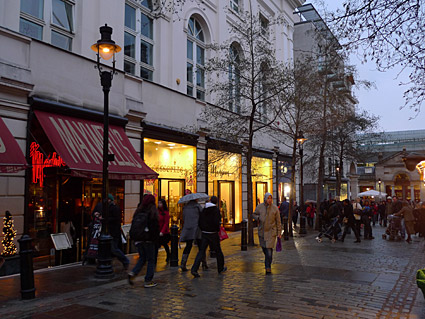
THE TRUE LIGHT.
In one of the country districts of England, many years ago, there stood a lonely forge. The man who worked it was obliged often to remain there late at night, and to walk to his home through the dark country lanes and roads. He had often watched the gas from the coal, which he used in his, furnace, and knew that it gave a clear, bright light. Then he thought to himself, "Why not have a light on my way home these dark nights?"
So he procured a large bladder, filled it with the waste gas from the forge fire, secured it, fastening in a small pipe-stem, through which there came out a stream of gas; this he lighted, took the bladder under his arm, and walked home with a light to guide his feet, that they should not stumble or lead him where he might fall.
This same man had an apprentice boy named James Clegg, who saw this singular night-lamp, but thought nothing of it until, being grown to man-hood, he came to live in the city of London. That was many, many years ago, when people had not yet heard of gas lights. The great city of London was lighted by lamps filled with oil, and in their houses people used candles. The rich used the beautiful, clear wax-lights, but the greater number burned common tallow candles, molded or dipped, and the very poor had only the farthing rush-lights, which were sold four for a penny. When Clegg saw how dimly the streets of this great city were lighted, for the light of a smoking oil lamp will not shine very far on dark or stormy nights, he remembered his old master's night-light, and began to think it might be possible to light the city of London in that way. He asked leave of Parliament to try the experiment. At first he was laughed at, but, persisting in his applications, he at last obtained permission to make the trial.
Having completed his arrangements, he invited the members of Parliament, and the principal gentlemen of the city, to witness the first lighting of this new illuminator. It was successful. The light was clear and beautiful; but the judges feared it might explode by some chance spark, and cause death and destruction. To prove that this could not happen, Clegg caught up a light, and, throwing it into the gas-tank, the whole mass burned with a brilliant flame, lighting up the gazing crowd as they had never been lighted before.
These stubborn wise heads, however, were not to be convinced. They accused him of a treasonable intention to destroy the members of Parliament, lords, and honorable gentlemen, by calling them together under this pretense, that he might put them all to death by his horrible invention, which, they said, had failed of its object. They would not listen to anything more he wished to say, but seized him and threw him into prison, and for many years longer the city of London held to her cherished darkness.
Does not this make you think of the way in which, Christ the true Light of the world, has been treated by men. He came into the world to be a "lamp unto our feet and a light unto our path;" but he was rejected of men, and suffered a cruel death on the cross. "He came unto his own, and his own received him not." Since that time many prophets and apostles have come to tell men of this wonderful Light; but they, too, have been sent to prison and to death. All through the ages men have rejected the true Light, and chosen rather to walk in their own darkness. Let us be careful that we, too, do not try to go through the world without this Light to show us the way!-
S. S. Advocate.